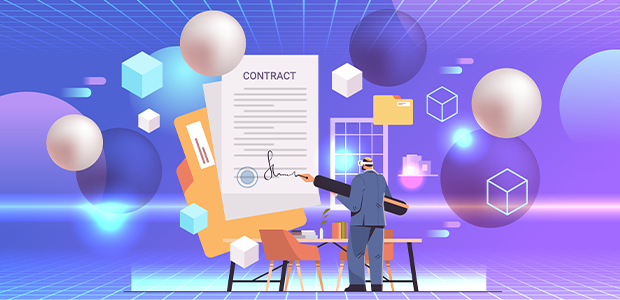
James Clough on Robin AI’s role in the evolving legaltech landscape
James Clough is the CTO and Co-Founder of Robin AI, a legaltech startup aiming to revolutionise the legal industry through advanced AI technology. Founded with the vision of making legal services more accessible, efficient, and cost-effective, Robin AI combines machine learning algorithms with expert legal knowledge.
 By transforming the way legal documents are managed and interpreted, Robin AI is setting a new standard for legaltech, making sophisticated legal tools available to companies of all sizes.
By transforming the way legal documents are managed and interpreted, Robin AI is setting a new standard for legaltech, making sophisticated legal tools available to companies of all sizes.
Startups Magazine caught up with James Clough to discuss Robin AI, the challenges and highlights, its partnership with Anthropic, and the future of the startup.
Clough began his career in academia, completing his PhD in theoretical physics, and later moving into the AI and machine learning space around 10 years ago when the deep learning revolution was starting.
He discussed the idea that started the Robin AI journey: “I spent a few years doing AI research in an academic context, which was mainly in the medical image analysis field, which is obviously not the same as legal work, but has quite a lot of similarities. In both cases, it's very important that you have it right. There's a really high standard of accuracy needed in both cases, the data is also very confidential and hard to acquire. And so, there are lots of interesting challenges as to how do you handle those problems? How do you get really high performance when you still have very limited or hard to apply datasets?
“I was doing that work for a few years and then in 2019, I got in touch with an old friend I met at university, Richard [Robinson], who’s the CEO and Co-Founder [of Robin AI].
“He’d been a lawyer for about six to seven years working in the city. During that time as a lawyer, he said that he and his colleagues were staying in the office until 3am, doing work that you would call data entry if it was being done in any other world, like reading long forms, and then finding things and then typing them in a little box somewhere else. But the reason they were doing that was because they didn't have any good software to help them do their work. So, we set out to build that software.”
Robin AI was built out of a problem that was identified in the industry, which meant with a solution that could automate the data entry tasks, those in the legal field would be able to save time and spent more time on the work that really matters.
Clough explained: “What we are building is a legal co-pilot, it’s an AI-driven assistant for people doing legal work, and in particular, legal work to do with contracts.
“Essentially, a lot of the work that lawyers need to do relating to contracts is what we would call ‘text in text out’ work. You can imagine they're sitting at their desk, and they get an email that says, here's a contract, can you review it? Find anything that's risky, or can you negotiate this or can you answer these questions about this document? And that's the text coming in. And when they do their job, some text comes out the other side, maybe they answer the question, maybe they write a new contract, maybe they edit it or negotiate it. But at the end of the day, some text is coming in, some thinking happens, and then some text comes out the other side.
“That's what we're doing using AI to do. At the end of the day, text comes in, some thinking happens, and then some text comes out.”
What distinguishes Robin AI in the legal landscape?
“I think with any startup, there’s always a matter of timing,” commented Clough. “I think there’s a whole generation of legaltech that came before us, but the generation before struggled to do anything other than very low complexity work. This was for a simple reason: you need your AI to be able to understand the words in contracts to be able to do the work, and until recently, it wasn’t able to. It was still the human lawyer using the software who was understanding the words, so you couldn’t automate as much. You could make people 10-15% more efficient, but that’s not enough to convince someone to buy something.”
In comparison, Robin AI was founded at the exact moment the large language model (LLM) boom was taking off. “We started just before the LLM boom, but had insight that it was coming. So, what we did was try to build our product and the company in such a way as to be able to take advantage of that rising tide in technology when it happened. There are lots of other people who had spent loads of time and money building something that then just got made obsolete by GPT-3 and GPT-4 and Claude from Anthropic. We were able to build planning for that kind of thing to arrive, and build a product around it. The timing is one differentiator.”
Another differentiator is that Robin AI has always been champions of people working alongside AI. Clough explained: “We've always been advocates of the ‘human in the loop’ way of using AI.
“For any kind of work, where it just really matters that you get it right and it's also very difficult, it’s very tempting for people to try to say, ‘Look, our AI is just going to do this for you and it’s going to get it 100% right. You don't have to worry about it again.’ And that leads to disappointment. Whereas, we've always said our product isn’t a pilot, it’s a co-pilot. And if you have a co-pilot that means you need to have a pilot as well, and that pilot is a human lawyer or user who can decide what should be being done, and the AI’s job is to help them do it faster, and more effectively.”
Robin AI and Anthropic
Clough explained Robin AI’s partnership with Anthropic: “We started working with Anthropic, even before they launched, so that was very early in their journey, and we were a partner when they did their launch.
“They are a really useful partner, both from the perspective of having a good relationship with us. We have our engineers talking to their engineers, and we can get a sense of what's coming up on their roadmap, and that helps us direct our own roadmap as well. When we know, for example, they're going to release a new model with a really long context window, that means that we can build for that functionality knowing it's going to arrive in the future.
“Legal is a very good use case for what they're trying to do because their focus and philosophy is on safety, reliability, and consistency. They're not a move fast break things type company. They want to have that focus on safety.
“The other thing that's very productive about our partnership is that we're both working closely with AWS. And that means that we can use Anthropic’s models with AWS bedrock, which lets us get all of the benefits of Anthropic’s LLMs while keeping all of the data inside our cloud. So, it's sort of like we have our own private version of Anthropic models, and we don't have to send data over the internet.”
The challenges
Those working in legal are often risk averse and stuck in their ways, which can cause issues for the adoption of new innovations within the legaltech space. So how has Robin AI overcome this?
“I think one challenge is that lawyers and legal teams are naturally quite risk averse and conservative. And that's not a bad thing, right? You want your lawyer to think about risk. But what that means is that they're not as naturally inclined to try out new technology as lots of other professionals are. They also have very high standards, which means that it really needs to work before they're willing to buy it and spend money. So being able to sell to that kind of group of customers is a big challenge.
“I think the way we overcame that was by focusing on a particular segment of the market where people were just really, really suffering from not having a solution. We started out selling to the asset management industry. The reason that worked was that we weren't just offering to ‘cut your legal costs by X percent.’ They don't really care about that, but what they cared about was the fact that processing these contracts might take their law firm two weeks, and then they would lose a deal because someone else has got there faster.
“We were able to say the thing that takes them two weeks, we can do it in two hours, and that was worth paying for. So, the way to overcome that conservatism and that lack of desire to take risks around innovation was just to find people who are suffering so much today from not having some solution that they're willing to overcome that inertia around adopting something.”
The highlights
With the challenges of running a startup also come the highlights which outweigh the challenging points.
“Every time we fundraise it’s great, and it represents the business getting bigger and being able to provide a sense of progress and certainty.
“I think opening the New York office, which we did at the end of last year, was definitely one highlight. We moved from being a UK based business with one office in London to feeling like a global company.
“In the second half of last year, we got a shout out from Prime Minister Rishi Sunak in a speech, which we didn't know was going to happen until it happened. That was something that even people who don't work in this industry noticed that the startup we’ve been working on seems to be doing well.”
What’s next for Robin AI?
Robin AI is constantly growing, and with that comes exciting news and releases.
“We've got something in the pipeline that we're very excited about because it's a new use case for our product that allows us to do some work that law firms were previously charging a lot of money for, and we can do it much, much faster, for what we think would be about 1% of the price that the law firms are charging. In our own benchmarking that we've done so far, it’s as accurate or better than what the law firms are providing. So, I think there's going to be an interesting moment for us where it's going to be quite a stark comparison between what was previously possible and what we're doing now.”

